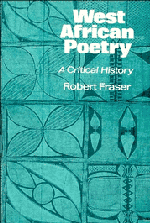Book contents
- Frontmatter
- Contents
- Acknowledgements
- West Africa: State borders and principal ethnic groupings
- Introduction
- 1 From oral to written verse: development or depletion?
- 2 Ladies and gentlemen
- 3 The négritude movement
- 4 Poetry and the university, 1957–63
- 5 The achievement of Christopher Okigbo
- 6 Continuity and adaptation in Ghanaian verse, 1952–71
- 7 Two Ijo poets
- 8 ‘Psalmody of sunsets’: The career of Lenrie Peters
- 9 The road to Idanre, 1959–67
- 10 The poet and war, 1966–70
- 11 The poetry of dissent, 1970–80
- 12 The return to orality
- A guide to availability
- Index
12 - The return to orality
Published online by Cambridge University Press: 03 May 2011
- Frontmatter
- Contents
- Acknowledgements
- West Africa: State borders and principal ethnic groupings
- Introduction
- 1 From oral to written verse: development or depletion?
- 2 Ladies and gentlemen
- 3 The négritude movement
- 4 Poetry and the university, 1957–63
- 5 The achievement of Christopher Okigbo
- 6 Continuity and adaptation in Ghanaian verse, 1952–71
- 7 Two Ijo poets
- 8 ‘Psalmody of sunsets’: The career of Lenrie Peters
- 9 The road to Idanre, 1959–67
- 10 The poet and war, 1966–70
- 11 The poetry of dissent, 1970–80
- 12 The return to orality
- A guide to availability
- Index
Summary
Early in the Second World War, a young Senegalese officer was sitting in a German prison camp listening to the expatiations of one of his captors, an Austrian who in civilian life was a linguist. The warder had just launched into a lecture on the significance of silence as a metrical ingredient in Austrian poetry when, like Archimedes of old, his interlocutor suddenly threw up his arms and shouted Eureka! How the Austrian reacted we do not know, but for the young Senegalese it was a moment of considerable clarification. What he had discovered was a formula which could explain the underlying order of West African, and more precisely Senegalese–Guinean, oral poetry. The discovery was important: the prisoner was a poet. He was also in search of a style.
Thirty years later that Senegalese poet, now president of the Republic of Senegal, wrote up his conclusions in an essay entitled, in honour of a French writer he much admired, ‘La Parole chez Paul Claudel et chez les négro-africans’. In this essay he tried to make his readers listen to traditional African poetry in a new way. So far, he believed, academic investigators into the structure of vernacular verse had lost themselves in a quagmire of irrelevance.
- Type
- Chapter
- Information
- West African PoetryA Critical History, pp. 311 - 340Publisher: Cambridge University PressPrint publication year: 1986



